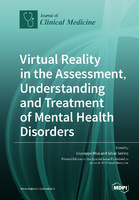Dublin Core
Title
Virtual Reality in the Assessment, Understanding and Treatment of Mental Health Disorders
Subject
Mental health
Description
In the computer sciences, virtual reality (VR) is usually described as a set of fancy technologies. However, in medicine and neuroscience, VR is instead defined as an advanced form of human–computer interface that allows the user to interact with and become present in a computer-generated environment. The sense of presence offered by VR makes it a powerful tool for personal change because it offers a world where the individual can stay and live a specific experience. For this reason, the use of VR in mental health shows promise: different types of research support its clinical efficacy for conditions including anxiety disorders, stress-related disorders, obesity and eating disorders, pain management, addiction, and schizophrenia. However, more research is needed to transform VR according to a clinical standard for mental health. This Special Issue aims to present the most recent advances in the mental health applications of VR, as well as their implications for future patient care.
Creator
Riva, Giuseppe (editor)
Serino, Silvia (editor)
Serino, Silvia (editor)
Source
https://directory.doabooks.org/handle/20.500.12854/68271
Publisher
MDPI - Multidisciplinary Digital Publishing Institute
Date
2021
Contributor
Sulistiorini
Rights
https://creativecommons.org/licenses/by/4.0/
Relation
1. Giuseppe Riva and Silvia Serino
Virtual Reality in the Assessment, Understanding and Treatment of Mental Health Disorders
Reprinted from: J. Clin. Med. 2020, 9, 3434, doi:10.3390/jcm9113434
2. Federica Scarpina, Silvia Serino, Anouk Keizer, Alice Chirico, Massimo Scacchi, Gianluca
Castelnuovo, Alessandro Mauro and Giuseppe Riva
The Effect of a Virtual-Reality Full-Body Illusion on Body Representation in Obesity
Reprinted from: J. Clin. Med. 2019, 8, 1330, doi:10.3390/jcm8091330
3. Luca Provenzano, Giuseppina Porciello, Sofia Ciccarone, Bigna Lenggenhager, Gaetano
Tieri, Matteo Marucci, Federico Dazzi, Camillo Loriedo and Ilaria Bufalari
Characterizing Body Image Distortion and Bodily Self-Plasticity in Anorexia Nervosa via
Visuo-Tactile Stimulation in Virtual Reality
Reprinted from: J. Clin. Med. 2020, 9, 98, doi:10.3390/jcm9010098
4. Gad Drori, Paz Bar-Tal, Yonatan Stern, Yair Zvilichovsky and Roy Salomon
UnReal? Investigating the Sense of Reality and Psychotic Symptoms with Virtual Reality
Reprinted from: J. Clin. Med. 2020, 9, 1627, doi:10.3390/jcm9061627
5. Mariano Alca ˜ niz Raya, Javier Mar´ın-Morales, Maria Eleonora Minissi, Gonzalo Teruel
Garcia, Luis Abad and Irene Alice Chicchi Giglioli
Machine Learning and Virtual Reality on Body Movements’ Behaviors to Classify Children with
Autism Spectrum Disorder
Reprinted from: J. Clin. Med. 2020, 9, 1260, doi:10.3390/jcm9051260
Virtual Reality in the Assessment, Understanding and Treatment of Mental Health Disorders
Reprinted from: J. Clin. Med. 2020, 9, 3434, doi:10.3390/jcm9113434
2. Federica Scarpina, Silvia Serino, Anouk Keizer, Alice Chirico, Massimo Scacchi, Gianluca
Castelnuovo, Alessandro Mauro and Giuseppe Riva
The Effect of a Virtual-Reality Full-Body Illusion on Body Representation in Obesity
Reprinted from: J. Clin. Med. 2019, 8, 1330, doi:10.3390/jcm8091330
3. Luca Provenzano, Giuseppina Porciello, Sofia Ciccarone, Bigna Lenggenhager, Gaetano
Tieri, Matteo Marucci, Federico Dazzi, Camillo Loriedo and Ilaria Bufalari
Characterizing Body Image Distortion and Bodily Self-Plasticity in Anorexia Nervosa via
Visuo-Tactile Stimulation in Virtual Reality
Reprinted from: J. Clin. Med. 2020, 9, 98, doi:10.3390/jcm9010098
4. Gad Drori, Paz Bar-Tal, Yonatan Stern, Yair Zvilichovsky and Roy Salomon
UnReal? Investigating the Sense of Reality and Psychotic Symptoms with Virtual Reality
Reprinted from: J. Clin. Med. 2020, 9, 1627, doi:10.3390/jcm9061627
5. Mariano Alca ˜ niz Raya, Javier Mar´ın-Morales, Maria Eleonora Minissi, Gonzalo Teruel
Garcia, Luis Abad and Irene Alice Chicchi Giglioli
Machine Learning and Virtual Reality on Body Movements’ Behaviors to Classify Children with
Autism Spectrum Disorder
Reprinted from: J. Clin. Med. 2020, 9, 1260, doi:10.3390/jcm9051260
Format
Pdf
Language
English
Type
Text
Identifier
DOI
10.3390/books978-3-03943-776-4
ISBN
9783039437757, 9783039437764
10.3390/books978-3-03943-776-4
ISBN
9783039437757, 9783039437764

